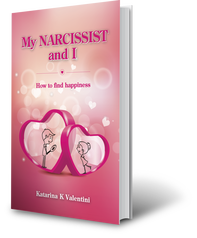|
I often get asked by clients in my practice “what is wrong with narcissists!?” Well, in my opinion, there is nothing wrong with them per se, at least with the majority of them. They are facing similar problems and issues as most of us do. But if you have ever browsed through the titles of books and articles on narcissists, you have certainly noticed that most of them talk about narcissists as some horrible creatures that must be avoided, escaped from, disarmed, defeated, and the like. One would think that there is absolutely nothing positive about them and that they are a modern day plague wreaking havoc in our personal and professional lives. The popular belief about them goes exactly like that. However, if we want to better understand narcissists and their way of being and behaving, we need to take a broader look at them. We cannot just stick to the narrow-minded conviction that they are despicable beings that should be shunned. I, for one, like narcissists and am rooting for them because I know that they are not the only ones to be blamed for everything that goes wrong in our relationships with them.
But let us first look at some general assumptions about narcissists with which I concur. Most of us would agree that narcissists are fascinating, attractive, intelligent, gallant, charming, successful, wonderful, charismatic, enigmatic, yet very self-absorbed and self-referenced people to whom we get attracted like moths to a flame. We cannot but like them and be mesmerized by them. They often give the impression of being superhuman, because listening to them we get the feeling that they are the masters of all trades and capable of achieving everything they set their minds to. However, they can also easily swing from one extreme to the other – from being wonderful and loving to being scornful, rejecting, cruel and humiliating. Therefore, we never know for sure what awaits us when we next see them. We are often left dumbfounded by their behavior. Hence the question “what is wrong with them?” Narcissists only seem to notice or take interest in other people when they need them, so that they can use them as a source of the narcissistic fuel and discard them as soon as they feel the devotion and deference to them crumbling. Unfortunately, that is frequently true. However, another theory prevails about them that I cannot agree with. One that leads many people to assume the worst about narcissists. Namely, that narcissists have zero empathy. Even the clinical definition goes that narcissists desperately lack empathy. It is true that the empathy narcissists feel is different in quality from that experienced by non-narcissistic people. While narcissists’ empathy is certainly more self-interested and intellectual, we cannot honestly claim that they have none of it. They have it, but are often not using it for the common good. If they truly had no empathy, then they would never have been able to charm our socks off, manipulate us or get under our skin. Yet they do, because they can empathically attune to our feelings and needs, and provide us with exactly what we need, albeit briefly it may be. Unfortunately, not many people take the time to see past the narcissistic mask that narcissists wear in public. Very few make the effort to climb over the wall narcissists surround themselves with in trying to hide their true self. What often gets overlooked, too, is that not all narcissists are the same. Malignant narcissists can much more be likened to people with antisocial personality disorder and should certainly be avoided. As for the other types, the toxic, show-off/gregarious and covert/vulnerable narcissists, we should be more understanding and less hostile towards them. Namely, the persona the narcissists display in their vain, pompous, condescending, arrogant, haughty public appearances is very often a defense mechanism. Deep down, narcissists have a terribly poor opinion of themselves. They consider themselves not worthy of love, have a very negative self-image, suffer from depression and abandonment anxiety and are convinced that other people are better than they are. Therefore, they need to wear all that armor just to be able to survive emotionally. But not many people notice or know that, not even narcissists’ partners. Hence, they engage in power struggles with narcissists, in the game of getting the upper hand – which only makes negative characteristics of everyone involved in the relationship to come to the surface. If I had to answer the question “what is wrong with narcissists?” I would have to extend that question to the people who enter in relationships with them and ask the same question about them. What is wrong with us that we allow narcissists to behave horribly towards us? Why do we put up with it? Because we, too, get hooked to the narcissists and cannot let go, despite all that is wrong with them. We get entangled in the negative dynamics not only because there is something wrong with narcissists, but because there is something wrong with us as well. We all contribute to the toxic and co-dependent relationships that we form with narcissists. How can we then define this “wrong” in all of us? The term does not mean that there is actually something wrong with us, in the sense that we are abnormal, weird, crazy, unworthy or not good enough. WRONG in this context can best be defined by our past unhealed wounds, our old script patterns and behaviors that we keep repeating, our unmet relational needs and the lack of self-worth. Therefore, instead of asking “what is wrong with narcissists?” let us rather look at how we contribute to their negative characteristics coming to the surface. As I have said in the introduction, I do not think there is anything wrong with narcissists. I like narcissists and find them to be charming, exciting, fun, smart people who bring color and spice to our lives. Problems arise when we start pushing each other’s wrong buttons out of our own insecurities. If we do not know which limiting script patterns govern our behavior and if we do not know how to change them, we will not be able to control ourselves nor handle narcissists. Having a fulfilling and healthy relationship with narcissists is possible, but we need to deal with our own “wrongs” before we can try to help resolve the “wrongs” of narcissists.
0 Comments
|
Katarina's Principle:“If we want to change the world, we need to talk about the elephant in the room. That is why I love real people who say what they mean and mean what they say. No fluff, no lies and no pretence.”
Archives
March 2024
Categories |



 RSS Feed
RSS Feed
